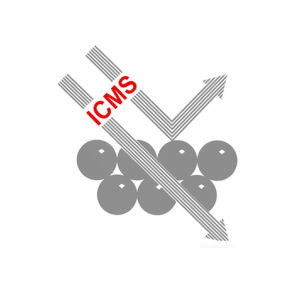Thematic Networks
ingESnet | Spanish Network on Surface Engineering and Thin FilmsRecent years have seen the organisation of short courses, conferences, congresses, etc. by different groups and institutions (CSIC, INTA, Univ. Complutense, etc.) in the field of surface engineering, with the full participation of researchers and technicians from industry. The researchers signing the proposal are: - Agustín R. González-Elipe (Materials Science Institute of Seville, CSIC) - Xermán de la Fuente (Materials Science Institute of Aragón, CSIC) - Albert Figueras (Materials Science Institute of Barcelona, CSIC) - Juan Damborenea (Metallurgy Research Centre, CSIC) - José M. Albella (Materials Science Institute of Madrid, CSIC). Coordinator. This Project has been approved, and is presented here. Its main aim is to promote activities furthering cooperation, at the R&D+i level, between the academic and industrial sectors in different technological fields related with surface alteration of materials to improve their functionality. We have a great number of activities ahead, and intend that this web page, still under construction, will be a meeting place to make contacts, interchange information, organise events, etc. http://www.ingesnet.org/view/index.php |
Virtual Institute on NanoFilmsThe organisation has been set up to facilitate exchange amongst those within the scientific community interested in nanofilms, their application, and future technology. It is expected that the bringing together of communities, combined with a greater unification of approach, will lead to the generation of new ideas and a more effective and efficient administration of research projects and their financial management. It is also envisaged that the organisation will improve integration of the European Institute of Technology and further consolidate the main European forces concerned with nanofilm research and product development. http://www.vinf.eu |
Synchrotron Radiation Thematic Network of CSICThe main aim of the network is to foment and coordinate the ventures of the scientific staff using SR. This community has reached a critical mass in Spain, specifically in CSIC, although the core of potential users is even broader. Among the activities to be carried out are the following: - Promote the prioritisation within CSIC Institutes of lines of work that use the potential offered by Alba and the Spanish participation in Soleil, and that offered currently by the Spanish line in the ESRF. - Undertake tasks of futurology on requirements in human capital and in infrastructures with regard to SR, strengthening group cooperation to attain these resources. In order to achieve its aims, the network will develop a series of activities and ventures closely related with those that could rise from the universities and other R&D agents. The link with AUSE is essential. The activities to be carried out include aspects of training, visibility and dissemination, identification of infrastructure needs, and strengthening of new lines of work based on the use of SR. http://www.icmm.csic.es/rtrs_csic/ |
Fuel Cell Network of CSICThe CSIC-University network of advanced batteries and hydrogen fuel cells is a response to the need to define thematic associations that increase the research mass, with regard to facets of the VI and VII European framework programme and the cooperation with industrial sectors. The climate of support in the offices of the Ministry of Education and Science, and the fomenting of networks of intra- and inter-public-body research, are lynchpins for the MEC Secretary-General of scientific policy. Notably, there is a critical mass of research in the topics of the network, which can be divided in the following areas: - Fluidodynamic automatisation and sensorisation, with the development of hydrogen and methanol sensors as one of the tasks. Significant tasks of the network are the following: strengthening the cooperation between the groups to achieve and develop research projects within the areas of the network and facilitate the exchange of human resources and infrastructures among them; organising postgraduate and similar training courses; channelling the birth and presentation of coordinated projects of research and infrastructure; running workshops on the results obtained by the various groups. |
RTPHC | CSIC Thematic Network Cultural HeritageIn CSIC there are research groups of recognised merit, dedicated totally or in part to the study of the historical and cultural heritage, either from a humanistic viewpoint or by the application of science and technology for the conservation of goods and real estate. These groups are found in various Institutes or Centres of the country, and given the thematic variety, their activities and those of their centres are coordinated from different areas of the CSIC (humanities, natural resources, materials, chemistry, etc.). This dispersal, and the complexity of the subject matter, dictate their coordination and the adoption of a multidisciplinary focus. In this way, the important patrimony of the CSIC, both human and instrumental, can be re-evaluated through the creation of mechanisms of activity, cooperation, the fomenting of multidisciplinary research, and projects in the field of the historical and cultural heritage. At the same time, most of these groups enjoy a very complete and advanced infrastructure and knowledge in their fields of activity, which should be fully exploited, making it available of other researchers of the network interested in its use. The foregoing explains the creation of the thematic network of historical and cultural heritage, which channels ventures, creates a critical mass, and contributes to a greater visibility and dissemination of the patrimonial research carried out in CSIC, so that it gets to the final users: Departments of Culture of ministries and regional authorities, museums, foundations, companies, etc. The network began its activities on 29 October 2001. http://www.rtphc.csic.es/ |
Nanospain | Spanish Network of NanotechnologyNanotechnology is one of the key technologies for competitive growth in Europe. It is also true that to guarantee competitiveness in European nanotechnology, a considerable investment will be required. To ensure that Spanish industry and R&D media have an important role in this area, the Spanish Network of Nanotechnology is aimed at promoting Spanish science through the management of multi-national networks to spur the commercial application of nanotechnology. A crucial aspect is the immediate start of cooperation between scientists and engineers to identify priorities and define the strategies to develop, study, characterise, construct, and test new nanodevices for semiconductors and information technology industries. The NanoSpain network enables the interchange of ideas and information between universities and companies, acting as a catalyser for Spanish research and industry. http://www.nanospain.org/nanospain.htm |
icms











